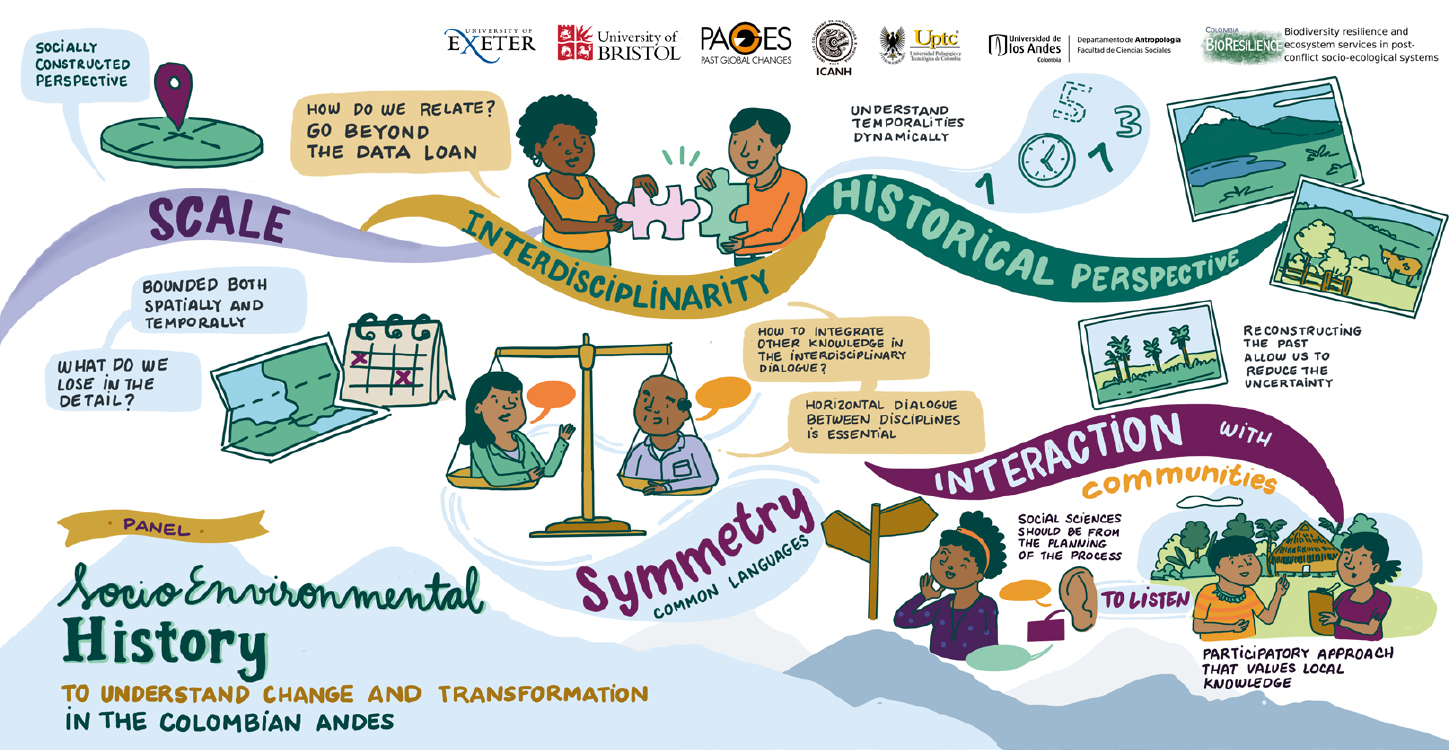- Home
- Publications
- PAGES Magazine
- Socio-environmental Histories and Interdisciplinary Perspectives On The Resilience of The Andean Tropical Forests of Colombia
Socio-environmental histories and interdisciplinary perspectives on the resilience of the Andean tropical forests of Colombia
Franco-Gaviria F and Amador-Jiménez M
Past Global Changes Magazine
29(2)
105
2021
Felipe Franco-Gaviria1 and Mónica Amador-Jiménez2
Online, 2-3 June 2021
This workshop on socio-environmental histories of the Colombian tropical Andean forests (pastglobalchanges.org/calendar/27028) fostered relevant academic and institutional exchanges between social and environmental disciplines. The workshop included eight invited panelists, two main speakers, eight working group moderators, eight poster presenters, and over 120 attendees each day. On average, 60 attendees participated in the breakout activities, which focused on understanding past human and landscape interactions in the tropical Andes of Colombia.
The workshop was a multidisciplinary event with 40% of academics and students from the natural sciences and 60% from the social sciences and the arts. The workshop followed a hybrid methodological concept, designed to promote interdisciplinary discussions. Over the course of two five-hour days, we held open conferences, panel discussions with experts and small discussion groups. In order to participate, it was compulsory to read articles, in advance, on environmental change issues in the Andes from journals and prestigious authors from the natural and social sciences. The breakout activity led to discussions within groups of eight people. This setting allowed for better interaction among participants, moderators, and panelists.
During the event we also experimented with "real-time illustrations" to summarize the discussions (Fig. 1). These six illustrations were widely distributed and shared among participants and the general public.
 |
|
Figure 1: A real-time illustration made at the meeting following working group discussions on integration frameworks that could bring social and natural sciences together. |
On the first day, the central theme was socio-environmental history, with the aim of understanding change and transformation in the Colombian Andes, thereby fostering a dialog between biophysical and social sciences. Introductory talks by Dunia Urrego and Henry Hooghiemstra, and the panel discussion moderated by Monica Amador, led the audience to reflect on the importance of temporal and spatial scales in studying the past. Some observations and comments led to the identification of pathways for integrating disciplines of the social and biophysical sciences into socio-environmental history. These discussions during the plenary session sparked a debate within the working groups where experts and attendees addressed possibilities of integrating knowledge, but also some of the assumptions that are made within the various disciplines regarding our interpretation of the interactions between humans and non-humans in the past (Fig. 1).
Following the same methodology, the second day was dedicated to addressing the relationships between socio-environmental history and public policy. This session began with Naomi Millner, who spoke on social aspects of socio-environmental history within the BioResilience research project (blogs.exeter.ac.uk/bioresilience), followed by Sonia Archila who presented a multi-species perspective on socio-environmental history. The panel of experts moderated by Nicolás Loaiza and Mónica Amador encouraged the interdisciplinary discussion on how a placed social and environmental history could be a tool to manage natural resources and integrate policymakers and stakeholders. For the plenary session with experts, the discussions highlighted the importance of integrating knowledge between different academic disciplines and local communities to improve our understanding of the long history of the territories. Extending historical projections of the landscapes could allow us to determine when laws were formulated and understand the public policy of each territory. All the presentations and discussions were recorded and transcribed, and will be synthesized into a document that condenses the meeting's outcomes. This will form the basis for an academic article on interdisciplinarity in socio-environmental reconstruction and history in the Andes.
After the workshop, discussions have continued between organizers and national institutions, such as the National Institute of Anthropology (ICANH), to give continuity to these working groups in socio-environmental history. The organizing committee is aiming for a second integration meeting, in person, in 2022. The planned outcomes after the first workshop are to publish (1) video recordings for the two sessions, (2) graphic summaries created in real-time, and (3) an interdisciplinary paper gathered from the different workshop discussions.
Acknowledgements
Many thanks to the panelists and keynote speakers Dunia Urrego (University of Exeter, UK), Henry Hooghiemstra (University of Amsterdam, The Netherlands), Juan Carlos Berrio (University of Leicester, United Kingdom), Katherinne Mora (Universidad Pedagógica y Tecnológica de Colombia), Javier Aceituno (Universidad de Antioquia, Colombia), Naomi Millner (University of Bristol, United Kingdom), Sonia Archila (Universidad de los Andes, Colombia), Andres Etter (Universidad Pontificia Javeriana, Colombia), Olga Lucia Hernandez (Instituto von Humboldt, Colombia), Hermán Amaya (Copoboyacá, Colombia), and Nicolás Loaiza (Instituto Colombiano de Antropología e Historia), and all moderators and the logistical team behind the screens. We also thank PAGES and the BioResilience research project for their support.
Affiliations
1College of Life and Environmental Sciences, University of Exeter, UK
2School of Geographical Sciences, University of Bristol, UK
contact
Felipe Franco-Gaviria: J.Franco-Gaviria exeter.ac.uk
exeter.ac.uk
